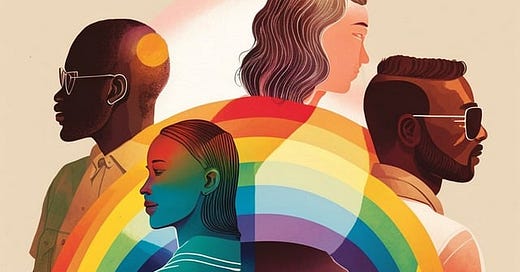Inherited Wounds: Understanding Trauma Through the Lens of Epigenetics
"The unspoken experiences that live in our unconscious are all around us."
Many years ago, as a young psychotherapist, I worked in a psychiatric outpatient clinic at a major hospital in New York City. The clinic provided medication, psychotherapy, and group psychotherapy to patients for what was then called the "Geriatric Clinic Outpatient Clinic." I was the therapist for one of the therapy groups. Several of the patients were the children of parents who survived the Holocaust. The second generation manifested the symptoms of fear, PTSD, depression, and difficulty relating to other people.
In more recent times, I have worked with clients whose parents were abusive when they were children. Some of these parents continued to be abusive even though their children were now adults. It was fascinating to learn that the parents survived abuse when they were children. Further investigation by my clients revealed that abuse marked many generations of the family.
It was impossible to write this essay without considering the trauma that people are currently experiencing in the Middle East, Ukraine, and other war-torn regions of the world. How will the inherited wounds of these wars affect their children and grandchildren?
Mark Wolynn is the Director of The Family Constellation Institute in San Francisco and a world leader in "Inherited Family Trauma."
Mark Wolynn's book, "It Didn't Start With You," looks at how trauma, even that of generations past, affects the individual and the entire family system. The book opens with a review of the science of epigenetics, which claims that our DNA carries the emotional experiences of our ancestors and influences our behaviors, emotions, and even our health. The book looks at how the traumas of a family manifest in later generations and in ways unrelated to the source of this kind of pain.
Coming full circle, one of the significant concepts is that trauma doesn't just disappear. It is stored in the unconscious. It stays in the family unit and is passed down through children, grandchildren, etc. Symptoms of inherited trauma come as anxiety, depression, chronic illness, or dysfunctional relationships. The afflicted individual is often unaware that the root of this misery lies in his family's history. Wolynn supports this phenomenon with personal stories and scientific evidence showing how these traumas skip awareness and stay vital to shaping people's lives.
Transgenerational trauma involves the infliction of emotional and psychic injury passing through from one generation to the next.
Individuals, their children, grandchildren, and further descendants feel anxiety, fear, or stress, yet everything seems just fine. Transgenerational trauma proposes that when a parent or grandparent experiences a traumatic event because of war, famine, or abuse, its effects spread throughout the family. But perhaps the most telling example of transgenerational trauma is found in the descendants of the Holocaust.
Epigenetics helps explain how this might happen. In basic terms, epigenetic development allows the environment and experiences to affect practical gene function without altering the genes. Our genes are like the instructions within our body, which say, "Do this, and do that." Consider them like an epigenetic switch, on and off, according to experience.
Understanding how connected families are is astonishing, not just through transgenerational trauma via epigenetics. The life experiences of one generation may affect another generation's health and well-being, thus illustrating that the healing of trauma is a family matter.
Let us not forget that transgenerational trauma affects all ethnic, racial, and religious groups. That includes people of color in the United States, Native Americans, and Asians in America, and if I have failed to list a group, please forgive me and send me a message.






I have been being treated for PTSD and ADHD for many years. The recognition of my experience began when I was a patient of a Jungian therapist who specialized in trauma. When I came to Chicago I got involved with a program treating survivors of sexual trauma, but I always felt that it was my parents who traumatized me more than getting raped. It’s kind of like childhood abuse set me up for further abuse when I grew up.
My dad’s father abandoned him and his mother in 1918 (during the flu epidemic). My grandmother remarried three years later because she got pregnant out of wedlock. My dad’s stepfather did not treat him well. I don’t want to go into detail about it, but my dad was a heavy drinker and when he got drunk he’d tell stories about things his stepfather had said and done to him that my sister and I had trouble believing. He was lovely to us, a great grandfather. But as an adult, after he died I found evidence of how petty he was toward my father and me. It changed forever any happy memories I had of him from when I was younger. I used to call him my grandfather, now I call him my dad’s stepfather. I’m only pissed that I didn’t know what a jerk he was when he was alive so I could have told him so.
I tried when I had my own child not to pass along the negligent cruelty of my family, but I’m not sure a lot of the time that I succeeded. My son has had psychotherapy off and on for years. When he was a teenager he was more than my husband and I could manage, which is when we took him for psychotherapy the first time. He was violent and abusive. I hardly ever hear from him unless I force the issue. I’m tired of feeling like a nag so I leave him alone. I send him articles from Substack or other media and that’s about it. Sometimes he responds but more often he doesn’t. His father is dead so I’m his only living relative other than a couple of cousins. His wife has a large extended family and I think he prefers them to me. I’m one; they are many. It’s kind of no contest. I can’t compete with that.
Luckily I’m an artist and I have friends so my life isn’t a disaster. I just don’t have much of a family. At least not a family of blood relations. Plus I’m an introvert. I’m never lonely. Being around people exhausts me and makes me nervous. Hope this testimony contributes something to the work you do.
Thank you Allan. Your article is important for us to understand. In my counselling I have found this to be true. I wonder if you are aware of any studies that support the view that treatments like psilocybin, which appears to be valuable in treating PTSD, are effective with generational trauma?